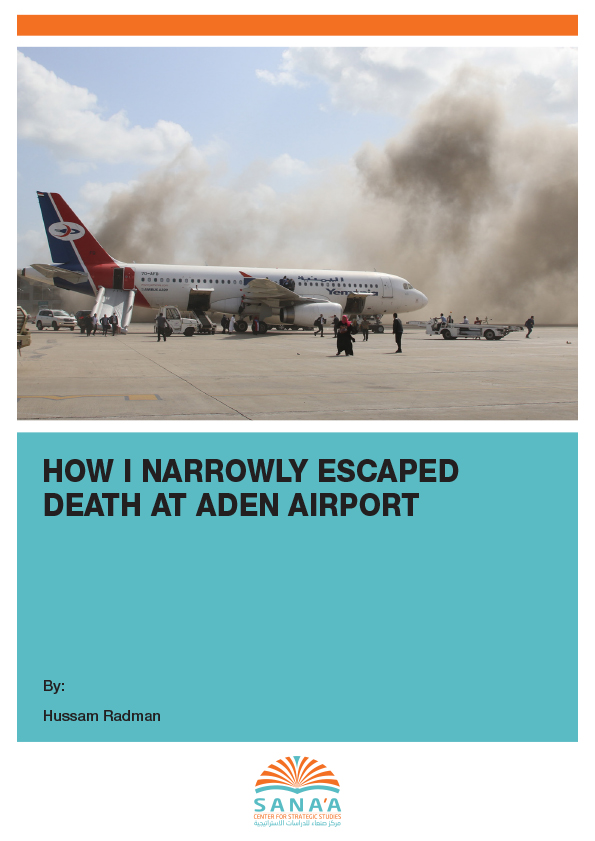Only a limited number of journalists and government officials were supposed to be present at Aden International Airport on December 30, 2020. However, to our surprise, hundreds of citizens had flocked since the early hours of the morning to welcome the new cabinet members, and some to celebrate the return of former Aden security director and prominent Southern Transitional Council (STC) figure, Major General Shalal Ali Shaye’a, to the interim capital. Large crowds gathered at the airport’s main gate in a festive atmosphere.
Inside the airport’s lounge, the crowd was divided in two: to the right were STC supporters, who made up a majority of the crowd; and to the left were supporters of the internationally recognized government. However, the groups soon mingled and exchanged greetings and complimentary remarks. It all seemed too good to be true. I whispered to a colleague: “It seems Santa Claus has been generous this year,” to which he replied: “I pray to God that everything goes and ends well.”
Ahead of the arrival of the plane carrying the new cabinet, journalists and government officials went out to the airport’s runway. Meanwhile, citizens had pushed their way through the lounge’s gate and managed to make it to the runway. The plan was to line up on the red carpet by 1:30 p.m., but because of the chaotic crowd the plane did not park in Square 1 as planned but rather farther away in Square 4. There, cabinet members stayed on the plane, waiting for Major General Shaye’a to get off first to withdraw his supporters from the airport and make way for the ministers to leave the aircraft.
I thought to myself how this chaos disturbed a perfect day. We did not know then, however, that the spontaneous disorder at the airport would save the country from further political chaos. The airplane’s doors reopened at 2:00 p.m., and I shouted to my colleagues to resume direct coverage. Five minutes and just 20 meters saved us from certain death. A loud explosion rocked the airport lounge, where we were supposed to go to carry out live coverage on television. All eyes and cameras turned toward the scene of the explosion. We heard gunfire and, for a while, we thought a booby-trapped bomb had gone off, followed by armed clashes. This was the most frustrating moment in my life, and I thought: “Are we truly this infiltrated?”
Before we could wrap our heads around what was happening, a second explosion went off, forcing everyone to run east. A few seconds later, there was a third explosion, confirming to everyone that these were the result of missile strikes. Panicked, everyone, including officials unable to maintain their poise, ran for their lives.
Escaping seemed like an absurd choice as we had no idea what the nature of the threat was and how to avoid it. Our actions were driven by instinct and instinct alone, and mere luck determined whether we ran in a safe direction or a direction that – God forbid – would be the target of a fourth missile attack. I thought to myself that perhaps it was better to stop than run blindly with no direction, but with my family in mind I decided to keep on running, even though I had no idea where to seek shelter. Two options emerged at the end of the runway: hide behind the Red Cross airplane – this was the choice of most civil officials – or head to a dirt area, toward the right – the choice of war correspondents and security officials, aware that the dirt would mitigate the intensity of the strikes. When I finally stopped running, I realized the person next to me had been injured by shrapnel in his foot.
Ten minutes passed without hearing any further explosions, and everyone began checking on friends via phone. We then returned to the scene of the explosions to help the injured and examine the damage.
Three long-range precision missiles, between two and three meters in length, had struck the airport: The first one hit the lounge where the largest number of victims were present; the second targeted a grassy area in front of the lounge; and the third struck Square 1 of the runway, where the aircraft was supposed to land. According to information from security sources, a fourth missile was supposed to target the airplane but had failed to launch. The missiles’ destruction seemed limited compared to ballistic missiles, but their small size allowed them to infiltrate the Patriot defense system stationed at the airport.
Personally, I was not overwhelmed by fear as a result of the explosions, perhaps due to the experience I gained while covering the West Coast battles. However, I felt extremely worried about the safety of government officials, particularly Aden Governor Ahmad Hamed Lamlas, who was close to the site of the explosions. Fortunately, Lamlas and the cabinet members who got off the plane via the emergency exit were evacuated from the airport by Saudi special forces within only four minutes. They headed to Ma’ashiq presidential palace, where, a few hours later, government forces successfully downed a drone hovering above the government’s headquarters.
The attack did not kill any of the Yemeni ministers; in fact, it boosted their political profiles, granting the unity cabinet more media coverage and popular momentum. Prime Minister Maeen Abdelmalek Saeed made a television appearance later in the day to address the Yemeni people, saying the attack had underscored the government’s responsibility for “ending the [Houthi] coup, restoring the state and spreading stability.” The next day, the prime minister met with the rest of the cabinet ministers at Ma’ashiq Palace, where they announced that the government held the armed Houthi movement and experts from the Iranian Revolutionary Guard Corps responsible for the terrorist attack.
The cabinet’s accusation was consistent with the logic of events. The Riyadh Agreement, the power-sharing agreement that led to the formation of a unity government, including representatives from the STC, represented a substantial change in the dynamics of the Yemeni conflict by enhancing the stability and cohesion of the anti-Houthi camp. Hence, it’s logical that the Houthi movement would attempt to thwart this development. In addition, the fact that only the Houthis had the military capabilities to carry out such a precise attack made them the prime suspect.
The government’s placement of blame was initially denied by the Houthi authorities in Sana’a, but later on, there were remarks by hawkish Houthi figures closer to Tehran hinting otherwise. On the same day as the attack on the airport, Iran’s ambassador to Sana’a decided to visit the grave of Saleh al-Sammad, the former president of the Houthis’ Supreme Political Council who was killed by a Saudi-led coalition airstrike in 2018. The next day, Mohammed Ali al-Houthi, the head of the Houthis’ Supreme Revolutionary Committee, boastingly spoke about what he called, “the new balance of deterrence achieved by the armed forces.”
The Houthis’ “deterrence” formula took the lives of more than 20 people and injured dozens, mostly civilians who had gathered at the departure terminal. I did not have enough courage to wander closer to the scene of the explosions, where injured people were screaming and dead bodies and body parts were scattered. I tried to check on most of my friends and colleagues to make sure they were alive and aided them as much I could before heading toward the VIP exit gate that directly leads from the runway toward the airport’s outer gate.
After leaving the airport, I had a strange feeling of victory, which may have come across in remarks I made to various media outlets via the phone. However, this did not last for more than a few hours. News reports eventually confirmed the martyrdom of my colleague, fellow journalist Adib al-Janani, a correspondent at Belqees TV, and provided a final count of the dead and injured, which was much higher than my initial expectations. I recalled Mahmoud Darwish’s verse: “rejoice, with utmost silence, because a reckless death lost the way to you in the heavy crowds … and deferred you.”
When I finally returned home that night, I jokingly told my wife: “I am your present for the New Year.” Like Prime Minister Maeen Abdelmalek, I tried to turn the crisis into an opportunity. It appears my move was successful, as she has not reprimanded me for failing to get her a gift for the New Year – at least until this piece is published.

 اقرأ المحتوى باللغة العربية
اقرأ المحتوى باللغة العربية
